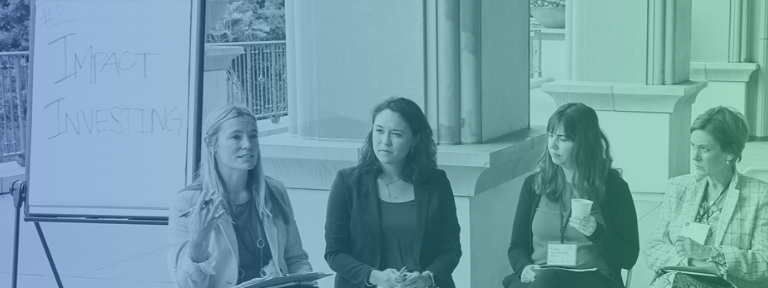As lead investors in our first Homebuilding Investment Fund*, Kara Ballester and her husband Andy were instrumental in jumpstarting our efforts to accelerate affordable housing with San Diego Habitat for Humanity. We wanted to know—what motivated Kara to invest in affordable homeownership, and what has her experience with impact investing been like?
We like to kick off dialogues about impact investing with a quote from a fellow impact investor, Ted Levinson. “Mainstream investing is moving money based on the future you predict. Impact investing is moving money based on the future you want.” What’s the future you want to create?
I really like that quote! The goals of our foundation, BQuest, are to mitigate the effects of climate change, create a more sustainable community, and increase access to affordable housing.
What experiences made you passionate about those issues?
Housing is Andy’s passion area, spurred partly by his experience being a business owner in San Diego. The skyrocketing cost of housing affects everyone living and working here. We were excited about the homebuilding investment strategy because of our experience investing in Thorn Brewery’s expansion in Barrio Logan.
After working in and exploring the Barrio Logan neighborhood, we wanted to be sure we were doing more than just investing in a business in the neighborhood.
Climate change is a shared interest for both us. The Intergovernmental Panel on Climate Change came out with a report last year saying we have until 2030 to drastically change our carbon footprint or we risk being locked into a wildly different and frankly unlivable world. That was a wakeup call for me. I’d always cared about environmental causes, but now had a foundation with which I could do more to create change on a systemic level.

That climate change report was a wakeup call for us, too—definitely a tough pill to swallow. If you could create your ideal future, what would it look like?
My ideal future is a world with housing for everyone. A world where green technology is the norm and actually helps to create a more equitable society. A society that doesn’t need to worry about carbon anymore. Smog-free cities which lead to healthier people. Electric-powered homes, free of gas lines which will make houses safer. Less dependence on factory farming, which would be better for the planet and animals. More trees in our cities which increases safety for pedestrians and generally makes life more enjoyable. There are just so many benefits to having a green way of life. This is the positive side to addressing climate change—it’s more than an existential threat. It’s also an opportunity to change for the better how we live and use resources.
How do you use impact investing at BQuest to support your vision of an ideal future?
We’ve taken a few different steps to ensure our assets are aligned with our vision at BQuest.
Step 1: We divested 100% from fossil fuels. That was a no-brainer. We couldn’t support the industries creating the crisis in the first place with our investments on one hand and then try to offset the effects with our grants on the other.
Step 2: We worked with our financial advisors to screen for companies with certain ESG (Environmental, Social, and Governance) scores that are doing business better than their peers.
Step 3: We looked for active investments like what Mission Driven Finance offers, where we’re able to choose to make something happen that wouldn’t have without our investment. I’d like to see more projects like this that actively create the world we want, rather than taking a passive backseat.
“As consumers, we talk about voting with our dollars all the time. Why wouldn’t we as a foundation use that same mindset when investing larger sums of money? Our investments shouldn’t be agnostic to what we’re trying to achieve with our foundation.”
You were the lead investor in our homebuilding investment strategy with Habitat for Humanity. What was it about Lori’s vision at San Diego Habitat that got you excited about investing?
Honestly, we were excited to have a local impact investing opportunity. There weren’t many options before we met Mission Driven Finance. The fact that it was focused on affordable housing, which is a part of our mission, was even better.
The homebuilding investment strategy is really well structured, easy to understand, and backs Habitat for Humanity, a nonprofit with a sterling reputation. I didn’t have to think twice about saying yes—Habitat already has a proven model, and the fund gives us an opportunity to increase their impact in our region. I didn’t have to wonder how homeowners were selected because they already had a successful, functioning system in place.
Essentially, we were excited to scale a solution in our own local community. The Comm22 site [supported by the Fund] is right down the street from where Andy first felt compelled to use our foundation to do something about housing affordability in our region. It all came full circle.
What motivated you to invest in this strategy rather than (or in addition to) making a donation to San Diego Habitat?
We invested because we were really interested in impact investing and wanted to help grow that ecosystem here in San Diego. What’s really awesome is that the money comes back to our foundation, so we’re then able to recycle it into more things we care about. Impact investing has the potential to create a ripple of change that is much bigger than simply giving a grant.
“I didn’t have to think twice about saying yes—Habitat already has a proven model and now we have an opportunity to increase their impact in our region.”
What was your experience like as an investor coming into the fund?
Mission Driven Finance made it easy for us to achieve our mission with the strategy to build affordable homes. Since it was local, we were able to meet with you and Habitat in person and really see the impact of our investment.
How does this experience compare to other investments you’ve made?
So far, this is the first impact investment we’ve done. Currently, we’re also exploring donating to nonprofits that allow low-income multifamily residences the opportunity to put solar panels on their buildings. Most of our investments are in the more traditional investment space, but we always try to screen for good ESG ratings.
“Impact investing has the potential to create a ripple of change that is much bigger than simply giving a grant.”
What about working and communicating with Mission Driven Finance and San Diego Habitat do you enjoy the most?
I enjoy the ease of communicating with you. Everyone at Mission Driven Finance is so easy to get ahold of. I don’t expect to have my hand held all the time but I do want relevant updates. I’m really appreciative of organizations that take the time to thoughtfully communicate with stakeholders. I also enjoy the newsletters and updates that you send out so I can get relevant information without tracking you down. It seems like every time I might start to have a question, there’s an update from you in my inbox that more than answers it.
What advice would you give to people still on the fence about impact investing?
It seems so obvious to me that I don’t know why anyone wouldn’t invest for impact. Take climate for example. If you’re passionate about climate change, why not fund things that further your goals rather than taking away from them? I can’t even imagine being invested in Exxon or other fossil fuel companies while making grants to climate and environmental organizations at the same time! It just doesn’t make sense.
We talk about consumers voting with their dollars all the time. Why wouldn’t we as a foundation use that same mindset with investing large sums of money? Our investments shouldn’t be agnostic to what we’re trying to achieve with our foundation.
*This fund is closed and is not accepting capital.


